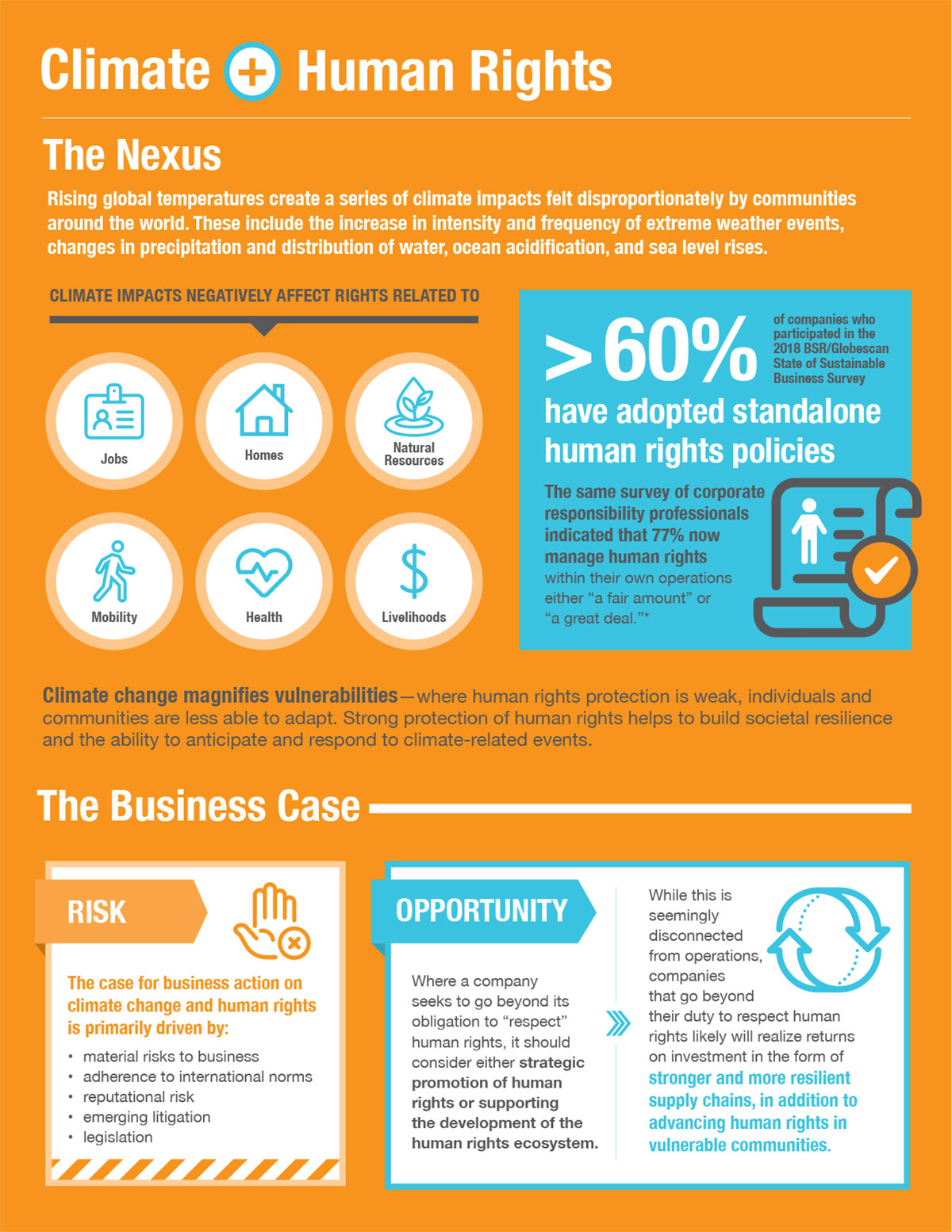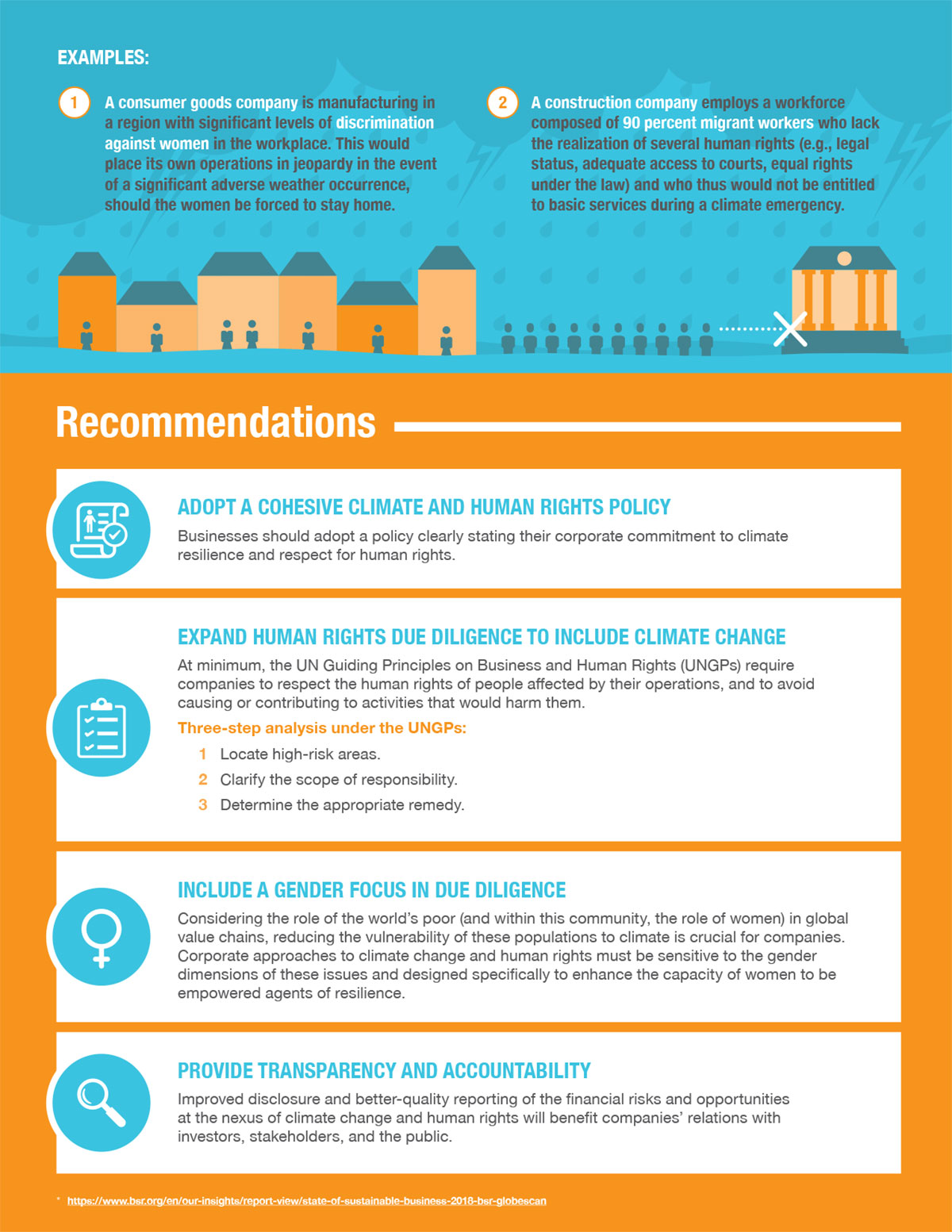Authors
-
Edward Cameron
Former Managing Director, BSR
-
Peter Nestor
Former Director, BSR
Climate change and human rights are intimately connected. The impacts of climate change undermine the realization of a range of internationally recognized human rights, including those dealing with life, health, food, adequate standard of living, housing, property, and water. The absence of adequate protection for human rights—particularly those that provide access to information, right to public participation in decision-making, and access to remedy—exacerbates vulnerability to climate impacts, magnifying the risk faced by the marginalized communities who are disproportionately impacted by climate change.
This paper demonstrates why and how business can act, including how to establish a deeper understanding of the nexus of climate change and human rights throughout the company as well as how businesses across sectors can articulate their risk and opportunities. It proposes operational principles to help companies identify, assess, prevent, mitigate, and remedy adverse climate change and human rights impacts.
This report is part of a series of six climate nexus reports that cover human rights, inclusive economy, women’s empowerment, supply chain, just transition, and health.
Climate and Human Rights
The Nexus
Rising global temperatures create a series of climate impacts felt disproportionately by communities around the world. These include the increase in intensity and frequency of extreme weather events, changes in precipitation and distribution of water, ocean acidification, and sea level rises.
Climate impacts negatively affect rights related to:
- Jobs
- Homes
- Natural Resources
- Mobility
- Health
- Livelihoods
More than 60 percent of companies who participated in the 2018 BSR/Globescan State of Sustainable Business survey have adopted standalone human rights policies.
The same survey of corporate responsibility professionals indicated that 77 percent now manage human rights within their own operations either “a fair amount” or “a great deal.”
Climate change magnifies vulnerabilities—where human rights protection is weak, individuals and communities are less able to adapt. Strong protection of human rights helps to build societal resilience and the ability to anticipate and respond to climate-related events.
The Business Case
Risk
The case for business action on climate change and human rights is primarily driven by:
- material risks to business
- adherence to international norms
- reputational risk
- emerging litigation
- legislation
Opportunity
Where a company seeks to go beyond its obligation to “respect” human rights, it should consider either strategic promotion of human rights or supporting the development of the human rights ecosystem.
While this is seemingly disconnected from operations, companies that go beyond their duty to respect human rights likely will realize returns on investment in the form of stronger and more resilient supply chains, in addition to advancing human rights in vulnerable communities.
Climate and Human Rights (continued)
Examples
- A consumer goods company is manufacturing in a region with significant levels of discrimination against women in the workplace. This would place its own operations in jeopardy in the event of a significant adverse weather occurrence, should the women be forced to stay home.
- A construction company employs a workforce composed of 90 percent migrant workers who lack the realization of several human rights (e.g., legal status, adequate access to courts, equal rights under the law) and who thus would not be entitled to basic services during a climate emergency.
Recommendations
Adopt a Cohesive Climate and Human Rights Policy
Businesses should adopt a policy clearly stating their corporate commitment to climate resilience and respect for human rights.
Expand Human Rights and Due Diligence to Include Climate Change
At minimum, the UN Guiding Principles on Business and Human Rights (UNGPs) require companies to respect the human rights of people affected by their operations, and to avoid causing or contributing to activities that would harm them.
Three-step analysis under the UNGPs:
- Locate high-risk areas.
- Clarify the scope of responsibility.
- Determine the appropriate remedy.
Include a Gender Focus in Due Diligence
Considering the role of the world’s poor (and within this community, the role of women) in global value chains, reducing the vulnerability of these populations to climate is crucial for companies. Corporate approaches to climate change and human rights must be sensitive to the gender dimensions of these issues and designed specifically to enhance the capacity of women to be empowered agents of resilience.
Provide Transparency and Accountability
Improved disclosure and better-quality reporting of the financial risks and opportunities at the nexus of climate change and human rights will benefit companies’ relations with investors, stakeholders, and the public.
Climate Nexus Report Series
Download
Let’s talk about how BSR can help you to transform your business and achieve your sustainability goals.










